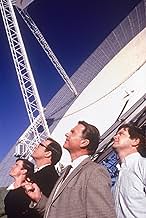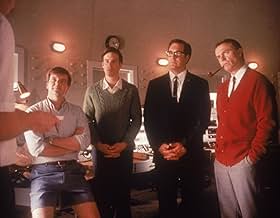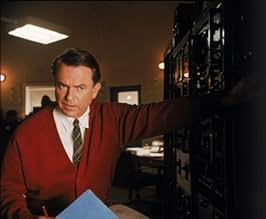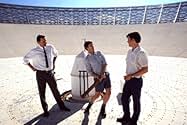CALIFICACIÓN DE IMDb
7.2/10
18 k
TU CALIFICACIÓN
Una remota antena de radio australiana, poblada por personajes extravagantes, juega un papel clave en el primer alunizaje del Apolo.Una remota antena de radio australiana, poblada por personajes extravagantes, juega un papel clave en el primer alunizaje del Apolo.Una remota antena de radio australiana, poblada por personajes extravagantes, juega un papel clave en el primer alunizaje del Apolo.
- Dirección
- Guionistas
- Elenco
- Premios
- 3 premios ganados y 10 nominaciones en total
Beverley Dunn
- Secretary v
- (voz)
- …
Opiniones destacadas
I am a die-hard movie buff and I had never heard of this movie until my brother brought it to Thanksgiving. After watching it I was very pleased. A very fun movie with a great story and a delightfully quirky cast. The movie is worth watching just for Rudi, the security guard. Enjoy.
I did not expect too much from this movie and was very pleasantly surprised by its quality across the board. My expectations did increase the moment I noticed that top billing goes to Sam Neill ("The Piano," "Jurassic Park," "Reilly: Ace of Spies"). Don't hold this against the movie, but the true story of Australia's role in the first moon landing gives it redeeming educational value as well as some suspense, believe it or not. I had no idea that the Australians were suffering from so many glitches that it was a miracle that they pulled it off. There are many funny moments in the movie such as when the likeable but clueless security guard, Rudi, says, "Halt, who goes there?" and after a moment you here a sheep bleating. Yes, the most sophisticated radio telescope in the Southern Hemisphere in 1969 was in the middle of a sheep paddock. Another noteworthy feature is the movie's soundtrack. I can say, having lived in 1969, that the movie reflects what people actually heard when they turned on the radio that year, as opposed to the usual "best of" soundtrack you hear in most movies set in the sixties. For that reason I couldn't recommend the CD of this movie's soundtrack if it exists.
"The Dish" is a real crowd pleaser, which surpassed my initial expectations. I guess you could say that it falls into that little genre of world cinema known as the "regional comedy." Such examples might include "Cinema Paradiso" or "The Full Monty." It looks, quite lovingly, at the lives of several characters and their environment, providing subtle humour and a healthy dose of sentiment as well. What makes this film particularly interesting is its take on the first moon landing of Neil Armstrong and Buzz Aldrin in 1969. While usually covered in an American jingoistic mode of filmmaking, "The Dish" offers a fresh, outside perspective. How did the world view it? How were Americans viewed? The detached perspective of the Australians is the source of much humour within the film, culminating in a few scenes where the responsibility of providing a relay signal from Apollo 11 to Houston is placed fully upon the small band of dish operators in rural Australia. Perhaps the most profound thing about this film is that it is largely based on a true story.
With an all-round solid cast, led by Sam Neill and Tom Long.
With an all-round solid cast, led by Sam Neill and Tom Long.
Sometimes I feel sorry for the people who didn't get to experience the excitement of the early days of the manned space program. The miracle of space exploration is all so routine to them, it's hard to explain what the "big deal" was all about.
This movie perfectly captures the excitement of the first manned moon landing, and does it from a point-of-view that most people never think about. It's funny: we see the images on our TV, and most of the time we never even think about how they got there. It's just TV, right? It comes out of a box (or, nowadays, a flat screen), right? It just comes through wires or through the air.
This movie is about one of the massive antenna assemblies that received the images from the Apollo XI mooncast, and about the people who made it work. And while that sounds more like something that you'd expect to see on a "how it's made" show on the Science Channel than in a movie, it's actually a wonderfully entertaining and funny movie about people who are engaging and funny, and who are doing a critical and fascinating job that made it possible for millions of people worldwide to watch, live, one of humanity's great milestone events.
And another nice thing about it: this is a FAMILY movie. There is no nudity, no violence, and although the movie has a PG-13 rating, I can't remember any language in it that was overtly offensive.
Sam Neill stars in this movie as Cliff Buxton, the guy who is in charge of the huge antenna dish that gives the movie its title. Neill is excellent in this. He does a superb job in bringing out the nuances of the character and in working with the other people in this movie. My only problem with him is that in the sequence that frames the movie, when he has to appear aged, a truly AWFUL job of makeup was done. It looked like something that might be done in an elementary school play by kids who borrowed their mom's makeup kit. Please, please try to ignore this cringe-inducing look, because it's very brief and Neill looks fine the rest of the movie.
The rest of the cast is also very good, although I don't think any of them are well-known or very familiar. They do well with the material, and there's a real sense of a group of people who like each other and care about each other, while at the same time occasionally getting on each other's nerves. They're mostly engineering/scientist types, which basically means they're aware that they're better with machines and numbers than they are with people. There's a little sub-plot involving romance that's very funny and sweet.
The tension in the movie comes from the fact that the giant antenna assembly that receives the lunar transmissions had to be pointed very precisely in order to get the reception, and that certain kinds of weather conditions made moving the giant antenna very dangerous. While most of the world was sitting in front of their TV sets, expectantly waiting for the "mooncast" to begin, there were a whole bunch of people in Australia, where the antenna was located, frantically working and making some very tough decisions to make it possible.
I have to say that the sequence when everyone is finally watching Neil Armstrong take his first steps on the moon really swept me back to when I was 12 years old and sitting spellbound on the couch in our living room, watching that shadowy shape on the TV screen make that "giant leap for mankind." I'd like to hope that maybe, through watching this movie, younger people who missed out on that magical moment will at least understand how transforming it was for the entire world. We don't have many moments like that in history. I'm glad I was there for this one. And this movie captures that moment, when just for a few heartbeats while we watched the blurry black-and-white image of a man in a spacesuit slowly coming down a ladder, literally everyone in the world was riveted and united by a sense of perfect awe.
And I'm glad this movie captures some of the magic of that particular event, and gives us some insight into what it took to bring it to the world on TV. That it almost didn't make it live onto TV was something I didn't fully appreciate until I saw "The Dish."
This is a great movie to enjoy with your family. I don't like to say "family movie," because that conjures up something silly and trivial and kid-centric, which this movie is not. I really enjoyed it and I think anyone who is into the space program or who can identify with engineers and scientists will like it too.
This movie perfectly captures the excitement of the first manned moon landing, and does it from a point-of-view that most people never think about. It's funny: we see the images on our TV, and most of the time we never even think about how they got there. It's just TV, right? It comes out of a box (or, nowadays, a flat screen), right? It just comes through wires or through the air.
This movie is about one of the massive antenna assemblies that received the images from the Apollo XI mooncast, and about the people who made it work. And while that sounds more like something that you'd expect to see on a "how it's made" show on the Science Channel than in a movie, it's actually a wonderfully entertaining and funny movie about people who are engaging and funny, and who are doing a critical and fascinating job that made it possible for millions of people worldwide to watch, live, one of humanity's great milestone events.
And another nice thing about it: this is a FAMILY movie. There is no nudity, no violence, and although the movie has a PG-13 rating, I can't remember any language in it that was overtly offensive.
Sam Neill stars in this movie as Cliff Buxton, the guy who is in charge of the huge antenna dish that gives the movie its title. Neill is excellent in this. He does a superb job in bringing out the nuances of the character and in working with the other people in this movie. My only problem with him is that in the sequence that frames the movie, when he has to appear aged, a truly AWFUL job of makeup was done. It looked like something that might be done in an elementary school play by kids who borrowed their mom's makeup kit. Please, please try to ignore this cringe-inducing look, because it's very brief and Neill looks fine the rest of the movie.
The rest of the cast is also very good, although I don't think any of them are well-known or very familiar. They do well with the material, and there's a real sense of a group of people who like each other and care about each other, while at the same time occasionally getting on each other's nerves. They're mostly engineering/scientist types, which basically means they're aware that they're better with machines and numbers than they are with people. There's a little sub-plot involving romance that's very funny and sweet.
The tension in the movie comes from the fact that the giant antenna assembly that receives the lunar transmissions had to be pointed very precisely in order to get the reception, and that certain kinds of weather conditions made moving the giant antenna very dangerous. While most of the world was sitting in front of their TV sets, expectantly waiting for the "mooncast" to begin, there were a whole bunch of people in Australia, where the antenna was located, frantically working and making some very tough decisions to make it possible.
I have to say that the sequence when everyone is finally watching Neil Armstrong take his first steps on the moon really swept me back to when I was 12 years old and sitting spellbound on the couch in our living room, watching that shadowy shape on the TV screen make that "giant leap for mankind." I'd like to hope that maybe, through watching this movie, younger people who missed out on that magical moment will at least understand how transforming it was for the entire world. We don't have many moments like that in history. I'm glad I was there for this one. And this movie captures that moment, when just for a few heartbeats while we watched the blurry black-and-white image of a man in a spacesuit slowly coming down a ladder, literally everyone in the world was riveted and united by a sense of perfect awe.
And I'm glad this movie captures some of the magic of that particular event, and gives us some insight into what it took to bring it to the world on TV. That it almost didn't make it live onto TV was something I didn't fully appreciate until I saw "The Dish."
This is a great movie to enjoy with your family. I don't like to say "family movie," because that conjures up something silly and trivial and kid-centric, which this movie is not. I really enjoyed it and I think anyone who is into the space program or who can identify with engineers and scientists will like it too.
Once and a while a true surprise comes along. A film that is pleasantly surprising and enjoyable. Well, that's what "The Dish" is. It never takes itself too serious and never takes itself too lightly. It is just right.
It is centered around the true story of the largest satellite dish in the world, found in the middle of a sheep paddock in Australia. The dish, at one time, broadcast the Apollo 11 moon landing to the world, and this is the story of the problems the men who ran the dish went through.
Sam Neill and Patrick Warburton lead the group of four that manage the dish; the characters are all nice and pleasant and likable. No one is unlikable in this film.
Sam Neill is a great actor; I've liked him in films since "Dead Calm," but my real respect for his performances rose after he brought Dr. Allen Grant to life in "Jurassic Park."
Patrick Warburton, in my opinion, is one of the most underrated comedic actors in Hollywood. He always gets throwaway roles ("MIIB," "Big Trouble,"=etc...), but in this film he gets a leading role (sorta) and handles it excellently. He proves he really can act--serious or comedic--in films.
One thing that is so nice about "The Dish" is that it doesn't try to really prove anything extremely memorable. It's not trying to be the next big hit. It sticks to the facts while presenting some great actors and a twist of humor. And because of this, it is, possibly, one of the most pleasant film experiences I've had in recent years. Sometimes it's nice to sit back, relax and just watch a movie.
It is centered around the true story of the largest satellite dish in the world, found in the middle of a sheep paddock in Australia. The dish, at one time, broadcast the Apollo 11 moon landing to the world, and this is the story of the problems the men who ran the dish went through.
Sam Neill and Patrick Warburton lead the group of four that manage the dish; the characters are all nice and pleasant and likable. No one is unlikable in this film.
Sam Neill is a great actor; I've liked him in films since "Dead Calm," but my real respect for his performances rose after he brought Dr. Allen Grant to life in "Jurassic Park."
Patrick Warburton, in my opinion, is one of the most underrated comedic actors in Hollywood. He always gets throwaway roles ("MIIB," "Big Trouble,"=etc...), but in this film he gets a leading role (sorta) and handles it excellently. He proves he really can act--serious or comedic--in films.
One thing that is so nice about "The Dish" is that it doesn't try to really prove anything extremely memorable. It's not trying to be the next big hit. It sticks to the facts while presenting some great actors and a twist of humor. And because of this, it is, possibly, one of the most pleasant film experiences I've had in recent years. Sometimes it's nice to sit back, relax and just watch a movie.
¿Sabías que…?
- ErroresWhen Billy is explaining the Moon landing to his father, he anticipates Marie's line, "If you ask me, it's the most chauvinistic exercise in the history of the world." (He turns to look at her before she starts speaking even though she is interrupting the conversation.)
- Citas
Ross 'Mitch' Mitchell: That's bullshit. You just bullshitted NASA!
- Créditos curiososThe producers acknowledge the valuable assistance of the staff at the CSIRO Parkes Observatory and Visitors Centre, the Council and people of Parkes, New South Wales, and the Council and people of Forbes, New South Wales.
- ConexionesEdited into The Clock (2010)
- Bandas sonorasThe Day the World Stood Still
(2000)
Written by Edmund Choi
Vocal performance by Tina Arena
Tina Arena appears courtesy Sony Music Entertainment (Australia) Ltd
Additional performance by the Australian Boys Choir
Selecciones populares
Inicia sesión para calificar y agrega a la lista de videos para obtener recomendaciones personalizadas
- How long is The Dish?Con tecnología de Alexa
Detalles
- Fecha de lanzamiento
- Países de origen
- Sitios oficiales
- Idioma
- También se conoce como
- Тарілка
- Locaciones de filmación
- Productoras
- Ver más créditos de la compañía en IMDbPro
Taquilla
- Total en EE. UU. y Canadá
- USD 2,552,992
- Fin de semana de estreno en EE. UU. y Canadá
- USD 70,612
- 18 mar 2001
- Total a nivel mundial
- USD 16,578,157
- Tiempo de ejecución1 hora 41 minutos
- Color
- Mezcla de sonido
- Relación de aspecto
- 1.85 : 1
Contribuir a esta página
Sugiere una edición o agrega el contenido que falta






























